- Home
- Laini Taylor
Daughter of Smoke and Bone dosab-1 Page 5
Daughter of Smoke and Bone dosab-1 Read online
Page 5
He only gave her a weary look, as if to say, Nice try.
“What? You brought it up. And no, I don’t know the inhuman value of tusks. I have no idea.”
“Beyond price.” He started sawing at the duct tape with a curved knife.
“It’s a good thing I had some scuppies on me, then,” said Karou, flopping into the chair Bain had just vacated. “Otherwise you’d have lost your priceless tusks to another bidder.”
“What?”
“You didn’t give me enough money. This little bastard war criminal kept bidding them up and — well, I’m not sure he was a war criminal, but he had this certain indefinable war-criminaliness about him — and I could see he was determined to get them, so I… maybe I shouldn’t have, though, since you don’t approve of my… pettiness, did you call it?” She smiled sweetly and dangled the remaining beads of her necklace. It was more of a bracelet now.
She’d used her new itch trick on the man, wishing a relentless onslaught of cranny itches on him until he fled the room. Surely Brimstone knew; he always knew. It would be nice, she thought, if he would say thank you. Instead, he just slapped a coin onto the table.
A measly shing.
“That’s it? I dragged those things across Paris for you for a shing, while beardy gets away with double gavriels?”
Brimstone ignored her and extricated the tusks from their shroud. Twiga came to consult with him, and they muttered in undertones in their own language, which Karou had learned from the cradle in the natural way, and not by wish. It was a harsh tongue, growlsome and full of fricatives, with much of it rising from the throat. By comparison, even German or Hebrew seemed melodious.
While they talked about tooth configurations, Karou helped herself to the scuppy teacups and set about replenishing her string of nearly useless wishes, which she decided to keep as a multistrand bracelet for now. Twiga hauled the tusks over to his corner for cleaning, and Karou contemplated going home.
Home. The word always had air quotes around it in her mind. She’d done what she could to make her flat cozy, filling it with art, books, ornate lanterns, and a Persian carpet as soft as lynx fur, and of course there were her angel wings taking up one whole wall. But there was no help for its real emptiness; its close air was stirred by no breath but her own. When she was alone, the empty place within her, the missingness as she thought of it, seemed to swell. Even being with Kaz had done something to keep it at bay, though not enough. Never enough.
She thought of the little cot that used to be hers, tucked behind the tall bookcases in the back of the shop, and wished whimsically that she could stay here tonight. She could fall asleep like she used to, to the sound of murmured voices, Issa’s soft slither, the scritch of wee elsething beasties scampering in the shadows.
“Sweet girl.” Yasri bustled out of the kitchen with a tea tray. Beside the teapot was a plate of the custard-filled pastries in the shape of horns that were her specialty. “You must be hungry,” she said in her parrot voice. With a sideward glance at Brimstone, she added, “It’s not healthy for a growing girl, always running off hither and thither at not a moment’s notice.”
“That’s me, hither-and-thither girl,” said Karou. She grabbed a pastry and slumped in her chair to eat it.
Brimstone spared her a glance, then said to Yasri, “And I suppose it’s healthy for a growing girl to live on pastry?”
Yasri tutted. “I’d be happy to fix her a proper meal if you ever gave me warning, you great brute.” She turned to Karou. “You’re too thin, lovely. It isn’t becoming.”
“Mmm,” agreed Issa, caressing Karou’s hair. “She should be leopard, don’t you think? Sleek and lazy, fur hot from the sun, and not too lean. A well-fed leopard-girl, lapping from a bowl of cream.”
Karou smiled and ate. Yasri poured tea for them all, just how they liked it, which meant four sugars for Brimstone. After all these years, Karou still thought it was funny that the Wishmonger had a sweet tooth. She watched as he bent back to his never-ending work, stringing teeth into necklaces.
“Oryx leucoryx,” she identified as he selected a tooth from his tray.
He was unimpressed. “Antelopes are child’s play.”
“Give me a hard one, then.”
He handed her a shark’s tooth, and Karou was reminded of the hours she’d sat here with him as a child, learning teeth. “Mako,” she said.
“Longfin or shortfin?”
“Oh. Uh.” She went still, holding the tooth between her thumb and forefinger. Brimstone had trained her in this art since she was small, and she could read the origin and integrity of teeth from their subtle vibrations. She declared, “Short.”
He grunted, which was about as close as he came to praise.
“Did you know,” Karou asked him, “that mako shark fetuses eat each other in the womb?”
Issa, who was stroking Avigeth, gave a tch of disgust.
“It’s true. Only cannibal fetuses survive to be born. Can you imagine if people were like that?” She put her feet up on the desk and, two seconds later, at a dark look from Brimstone, took them down again.
The shop’s warmth was making her drowsy. The cot in its little nook called to her, as did the quilt Yasri had made her, so soft from years of snuggling. “Brimstone,” she said, hesitant. “Do you think—?”
At that moment, a thudding sounded, violent.
“Oh, dear,” said Yasri, clicking her beak in agitation as she gathered up the tea things.
It was the shop’s other door.
Back behind Twiga’s workspace, in the shadowed reaches of the shop where no lantern ever hung, there was a second door. In all Karou’s life, it had never been opened in her presence. She had no idea what was behind it.
The thudding came again, so hard it rattled the teeth in their jars. Brimstone rose, and Karou knew what was expected of her — that she rise, too, and leave at once — but she slouched down in her chair. “Let me stay,” she said. “I’ll be quiet. I’ll go back to my cot. I won’t look—”
“Karou,” said Brimstone. “You know the rules.”
“I hate the rules.”
He took a step toward her, prepared to help her out of the chair if she didn’t obey, and she shot to her feet, hands up in surrender. “Okay, okay.” She put on her coat as the banging continued, and grabbed another pastry from Yasri’s tray before letting Issa usher her into the vestibule. The door closed behind them, sealing out sound.
She didn’t bother asking Issa who was at the other door — Issa never gave away Brimstone’s secrets. But she said, a little pitifully, “I was just about to ask Brimstone if I could sleep in my old cot.”
Issa leaned forward to kiss her cheek and said, “Oh, sweet girl, wouldn’t that be nice? We can wait right here, the way we did when you were small.”
Ah, yes. When Karou was too small to shove out into the world’s streets on her own, Issa had kept her here. Hours they had sometimes crouched in this tiny space, Issa trying to keep her entertained by singing songs or drawing — in fact, it was Issa who had started her drawing — or crowning her with venomous snakes, while inside Brimstone confronted whatever lurked on the other side of that door.
“You can come back in,” Issa continued, “after.”
“That’s okay,” Karou said with a sigh. “I’ll just go.”
Issa squeezed her arm and said, “Sweet dreams, sweet girl,” and Karou hunched her shoulders and stepped back out into the cold. As she walked, clock towers across Prague started arguing midnight, and the long, fraught Monday came at last to a close.
9
THE DEVIL’S DOORWAYS
Akiva stood at the edge of a rooftop terrace in Riyadh, peering down at a doorway in the lane below. It was as nondescript as the others, but he knew it for what it was. He could feel its bitter aura of magic as an ache behind his eyes.
It was one of the devil’s portals into the human world.
Spreading vast wings that were visible only in his shadow, he gli
ded down to it, landing in a rain of sparks. A street sweeper saw him and dropped to his knees, but Akiva ignored him and faced the door, his hands curling into fists. He wanted nothing so much as to draw his swords and storm inside, end things quick right there in Brimstone’s shop, end them bloody, but the magic of the portals was cunning and he knew better than to attempt it, so he did what he had come here to do.
He reached out and laid his hand flat against the door. There was a soft glow and a smell of scorching, and when he took away his hand its print was scored into the wood.
That was all, for now.
He turned and walked away, and folk cringed close to walls to let him pass.
Certainly, they couldn’t see him as he truly was. His fiery wings were glamoured invisible, and he should have been able to pass as human, but he wasn’t quite pulling it off. What people saw was a tall young man, beautiful — truly, breath-stealingly beautiful, in a way one rarely beholds in real life — who moved among them with predatory grace, seeming no more mindful of them than if they were statuary in a garden of gods. On his back a pair of crossed swords were sheathed, and his sleeves were pushed up over forearms tanned and corded with muscle. His hands were a curiosity, etched both white with scars and black with the ink of tattoos — simple repeating black lines hatched across the tops of his fingers.
His dark hair was cropped close to his skull, with a hairline that dipped into a widow’s peak. His golden skin was bronzed darker across the planes of his face — high ridges of cheekbones, brow, bridge of the nose — as if he lived his life in drenching rich honey light.
Beautiful as he was, he was forbidding. It was difficult to imagine him breaking into a smile — which indeed Akiva hadn’t done in many years, and couldn’t imagine doing ever again.
But all of this was just fleeting impression. What people fixed on, stopping to watch him pass, were his eyes.
They were amber like a tiger’s, and like a tiger’s they were rimmed in black — the black both of heavy lashes and of kohl, which focused the gold of his irises like beams of light. They were pure and luminous, mesmerizing and achingly beautiful, but something was wrong, was missing. Humanity, perhaps, that quality of benevolence that humans have, without irony, named after themselves. When, coming around a corner, an old woman found herself in his path, the full force of his gaze fell on her and she gasped.
There was live fire in his eyes. She was sure he would set her alight.
She gasped and stumbled, and he reached out a hand to steady her. She felt heat, and when he continued past, his unseen wings brushed against her. Sparks shivered from them and she was left gaping in breathless, paralyzed panic at his receding form. Plainly she saw his shadow wings fan open and then, with a gust of heat that blew her headscarf off, he was gone.
In moments Akiva was up in the ether, scarcely feeling the sting of ice crystals in the thin air. He let his glamour fall away, and his wings were like sheets of fire sweeping the black of the heavens. He moved at speed, onward toward another human city to find another doorway bitter with the devil’s magic, and after that another, until all bore the black handprint.
In far reaches of the world, Hazael and Liraz were doing the same. Once all the doors were marked, the end would begin.
And it would begin with fire.
10
HITHER-AND-THITHER GIRL
In general, Karou managed to keep her two lives in balance. On the one hand, she was a seventeen-year-old art student in Prague; on the other, errand girl to an inhuman creature who was the closest thing she had to family. For the most part, she’d found that there was time enough in a week for both lives. If not every week, at least most.
This did not turn out to be one of those weeks.
Tuesday she was still in class when Kishmish alighted on the window ledge and rapped at the glass with his beak. His note was even more succinct than yesterday’s and read only Come. Karou did, though if she’d known where Brimstone was sending her, she might not have.
The animal market in Saigon was one of her least favorite places in the world. The caged kittens and German shepherds, the bats and sun bears and langur monkeys, were not sold as pets, but food. An old crone of a butcher’s mother saved teeth in a funerary urn, and it was Karou who had to collect them every few months and seal the deal with a sour swig of rice wine that left her stomach churning.
Wednesday: Northern Canada. Two Athabascan hunters, a sickening haul of wolf teeth.
Thursday: San Francisco, a young blonde herpetologist with a cache of rattlesnake fangs left over from her unfortunate research subjects.
“You know, you could come into the shop yourself,” Karou told her, irritated because she had a self-portrait due the next day and could have used the extra hours to perfect it.
There were various reasons why traders might not come into the shop. Some had lost the privilege through misbehavior; others weren’t yet vetted; many were simply afraid to submit to the serpent collars, which shouldn’t have been a problem in this case, since this particular scientist spent her days with snakes by choice.
The herpetologist shuddered. “I came once. I thought the snake-woman was going to kill me.”
Karou smothered a smile. “Ah.” She understood. Issa was no friend to reptile killers, and had been known to coax her snakes into semi-strangulation as the mood arose. “Well, okay.” She counted out twenties into a decent stack. “But you know, if you do come in, Brimstone will pay you wishes worth much more than this.” He did not, to Karou’s bitterness, entrust her to dispense wishes on his behalf.
“Maybe next time.”
“Your choice.” Karou shrugged and left with a little wave, to head back to the portal and through it, taking note as she did that a black handprint was scorched into its surface. She was going to mention it to Brimstone, but he was with a trader and she had homework to get to, so she went on her way.
Up half the night working on her self-portrait, she was groggy on Friday and hopeful that Brimstone wouldn’t summon her again. He usually didn’t send for her more than twice a week, and it had already been four times. In the morning, while drawing old Wiktor in nothing but a feather boa — a sight Zuzana almost did not survive — she kept an eye on the window. All through afternoon painting studio, she kept fearing that Kishmish would appear, but he didn’t, and after school she waited for Zuzana under a ledge out of the drizzle.
“Well,” said her friend, “it’s a Karou. Get a good look, folks. Sightings of this elusive creature are getting rarer all the time.”
Karou noted the coolness in her voice. “Poison?” she suggested hopefully. After the week she’d had, she wanted to go to the cafe and sink into a couch, gossip and laugh and sketch and drink tea and make up for lost normal.
Zuzana gave her the eyebrow. “What, no errands?”
“No, thank god. Come on, I’m freezing.”
“I don’t know, Karou. Maybe I have secret errands today.”
Karou chewed the inside of her cheek and wondered what to say. She hated the way Brimstone kept secrets from her, and she hated even more having to do the same thing to Zuzana. What kind of friendship was based on evasions and lies? Growing up, she’d found it almost impossible to have friends; the need for lies always got in the way. It had been even worse then because she’d lived in the shop — forget about having a friend over to play! She would exit the portal in Manhattan each morning for school, followed by her lessons in karate and aikido, and go back to it each evening.
It was a boarded-up door of an abandoned building in the East Village, and when Karou was in fifth grade a friend named Belinda had seen her go in and had come to the conclusion that she was homeless. Word got around, parents and teachers got involved, and Karou, unable to produce Esther, her fake grandmother, on short notice, was taken into DHS custody. She was put into a group home, from which she escaped the first night, never to be seen again. After that: a new school in Hong Kong and extra caution that no one saw her using the po
rtal. That meant more lies and secrecy, and no possibility of real friends.
She was old enough now that there was no risk of social services sniffing around, but as for friends, that was still a tightrope. Zuzana was the best friend she’d ever had, and she didn’t want to lose her.
She sighed. “I’m sorry about this week. It’s been crazy. It’s work—”
“Work? Since when do you work?”
“I work. What do you think I live on, rainwater and daydreams?”
She’d hoped to make Zuzana smile, but her friend just squinted at her. “How would I know what you live on, Karou? How long have we been friends, and you’ve never mentioned a job or a family or anything—”
Ignoring the “family or anything” part, Karou replied, “Well, it’s not exactly a job. I just run errands for this guy. Make pickups, meet with people.”
“What, like a drug dealer?”
“Come on, Zuze, really? He’s a… collector, I guess.”
“Oh? What does he collect?”
“Just stuff. Who cares?”
“I care. I’m interested. It just sounds weird, Karou. You’re not mixed up in something weird, are you?”
Oh no, thought Karou. Not at all. Taking a deep breath, she said, “I really can’t talk about it. It’s not my business, it’s his.”
“Fine. Whatever.” Zuzana spun on one platform heel and walked out into the rain.
“Wait!” Karou called after her. She wanted to talk about it. She wanted to tell Zuzana everything, to complain about her crappy week — the elephant tusks, the nightmarish animal market, how Brimstone only paid her in stupid shings, and the creepy banging on the other door. She could put it in her sketchbook, and that was something, but it wasn’t enough. She wanted to talk.
It was out of the question, of course. “Can we please go to Poison?” she asked, her voice coming out small and tired. Zuzana looked back and saw the expression that Karou sometimes got when she thought no one was watching. It was sadness, lostness, and the worst thing about it was the way it seemed like a default — like it was there all the time, and all her other expressions were just an array of masks she used to cover it up.

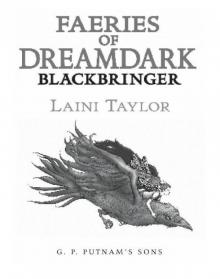 Blackbringer
Blackbringer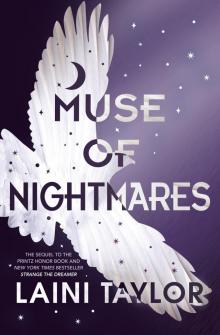 Muse of Nightmares
Muse of Nightmares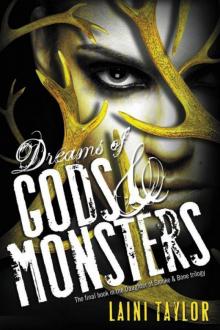 Dreams of Gods & Monsters
Dreams of Gods & Monsters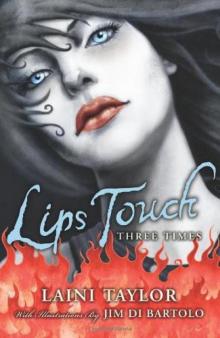 Lips Touch: Three Times
Lips Touch: Three Times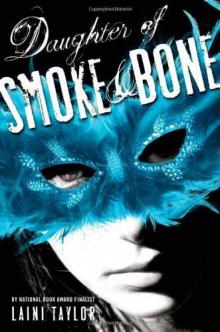 Daughter of Smoke & Bone
Daughter of Smoke & Bone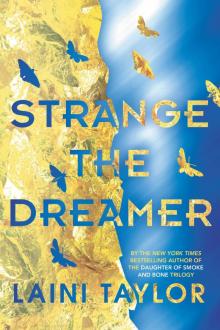 Strange the Dreamer
Strange the Dreamer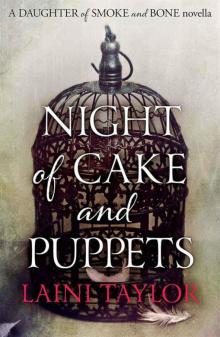 Night of Cake & Puppets
Night of Cake & Puppets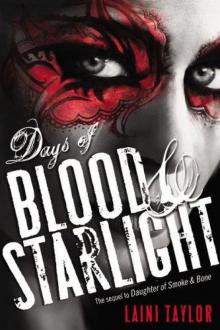 Days of Blood & Starlight
Days of Blood & Starlight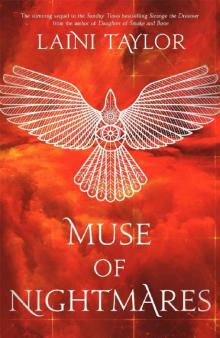 Muse of Nightmares (Strange the Dreamer #2_UK)
Muse of Nightmares (Strange the Dreamer #2_UK) Daughter of Smoke and Bone dosab-1
Daughter of Smoke and Bone dosab-1 Three Times
Three Times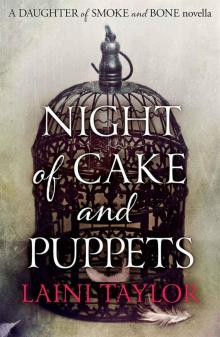 Night of Cake and Puppets (a Daughter of Smoke and Bone novella)
Night of Cake and Puppets (a Daughter of Smoke and Bone novella)